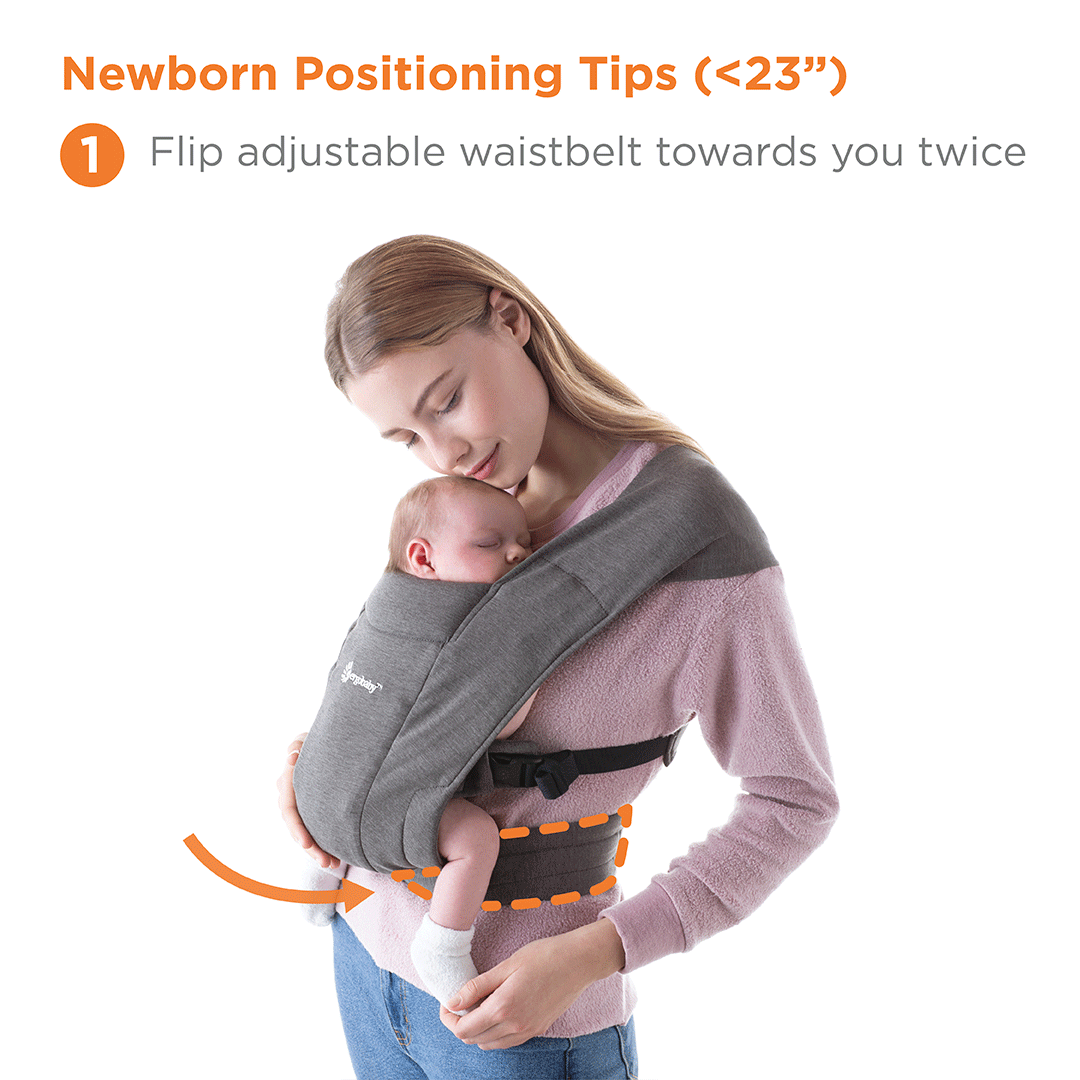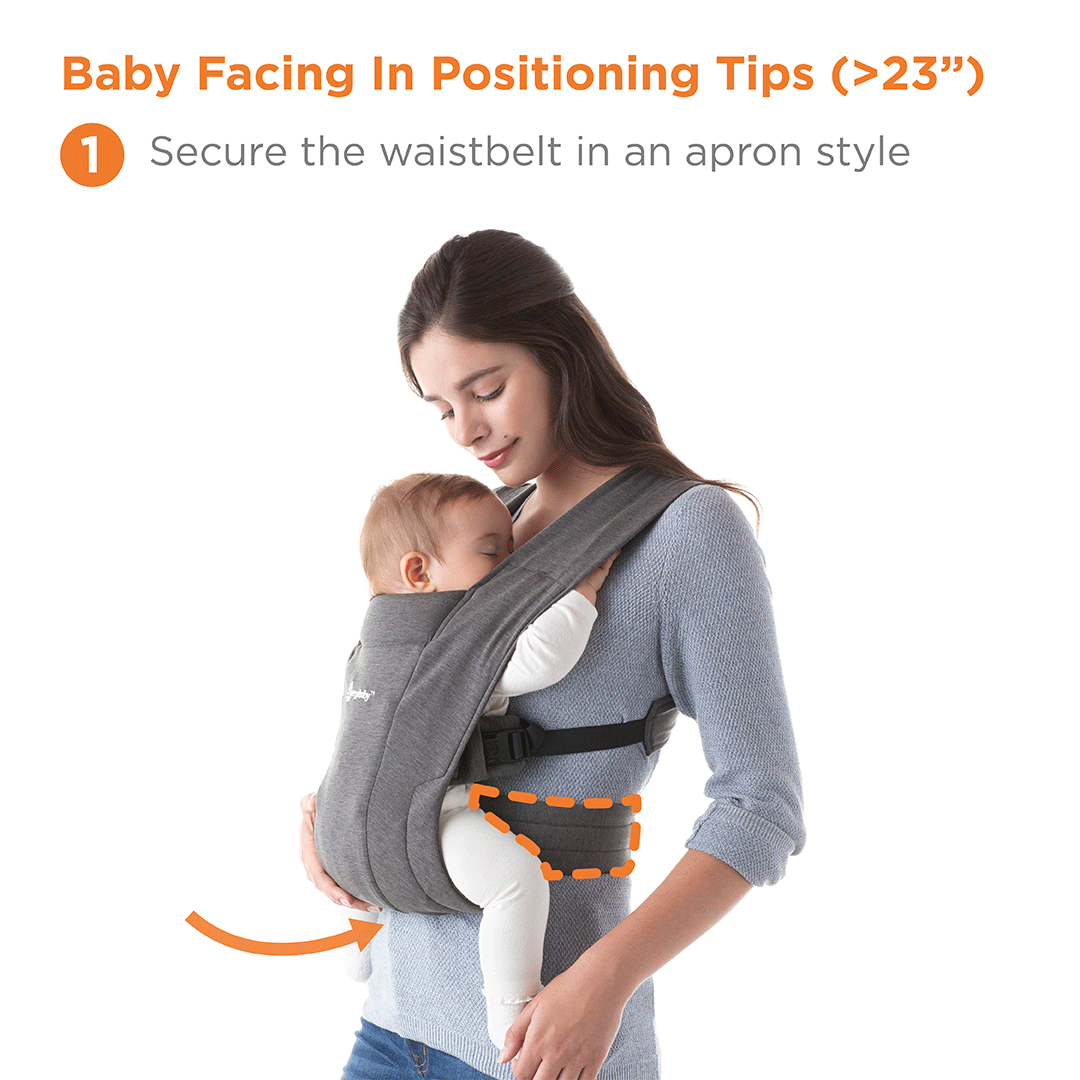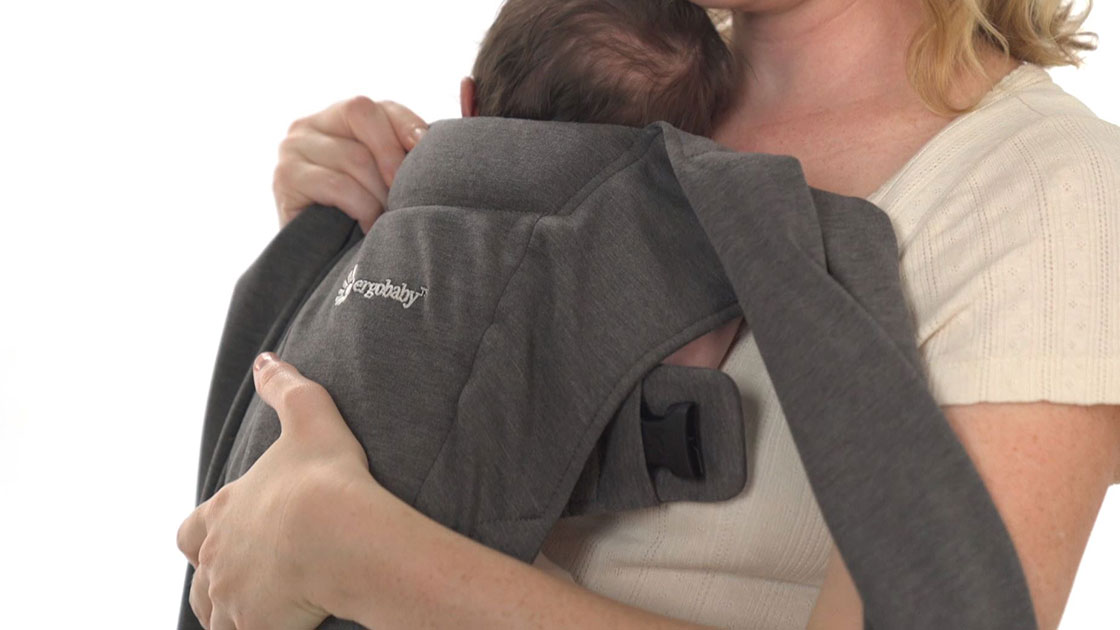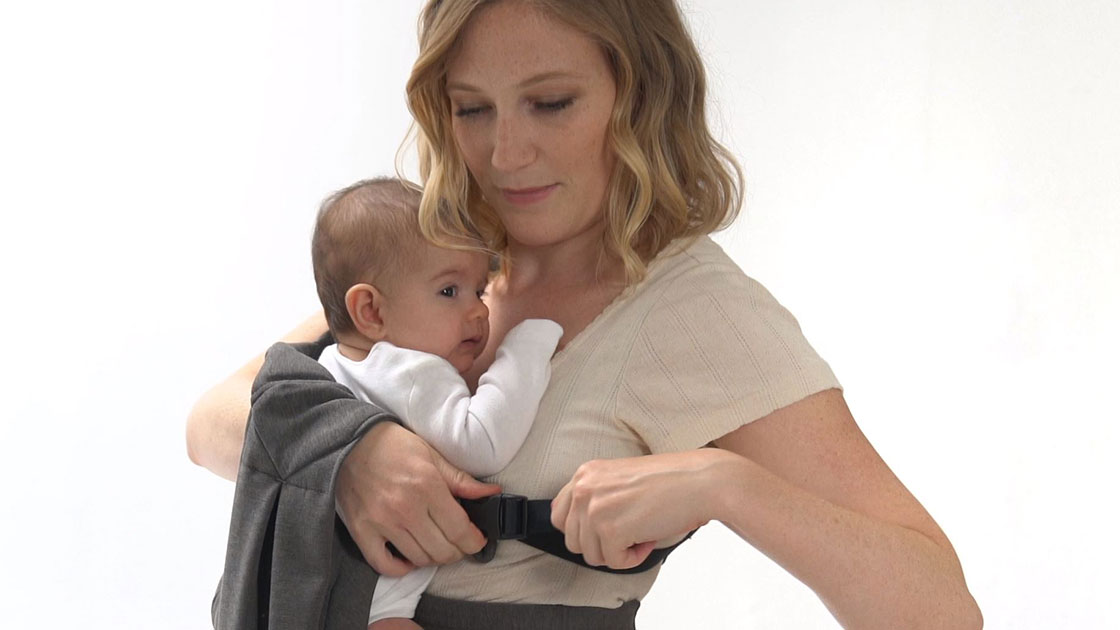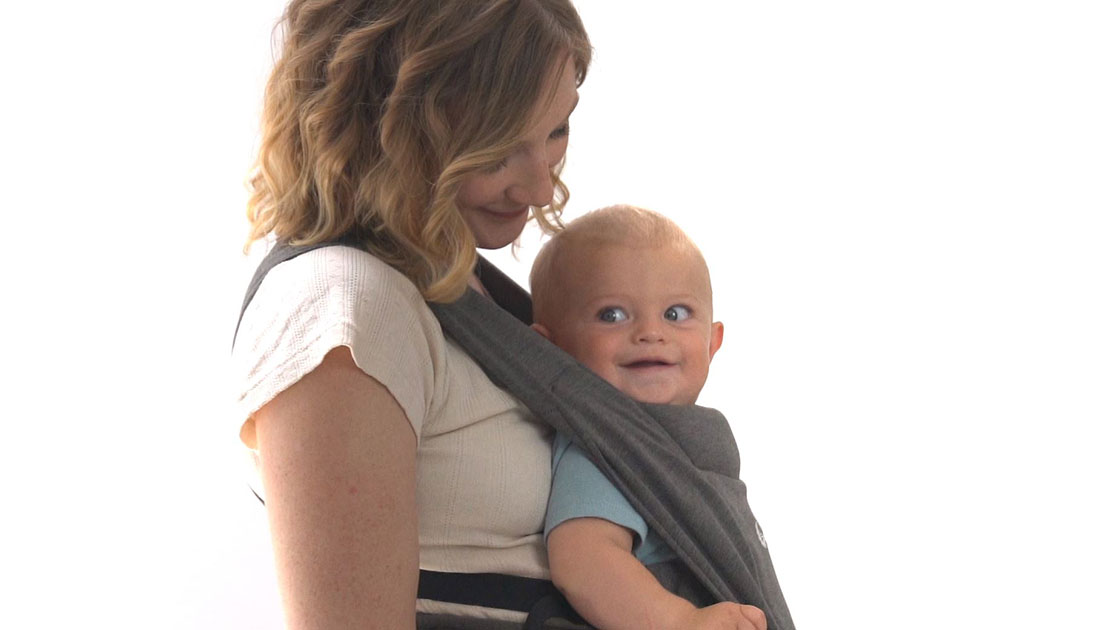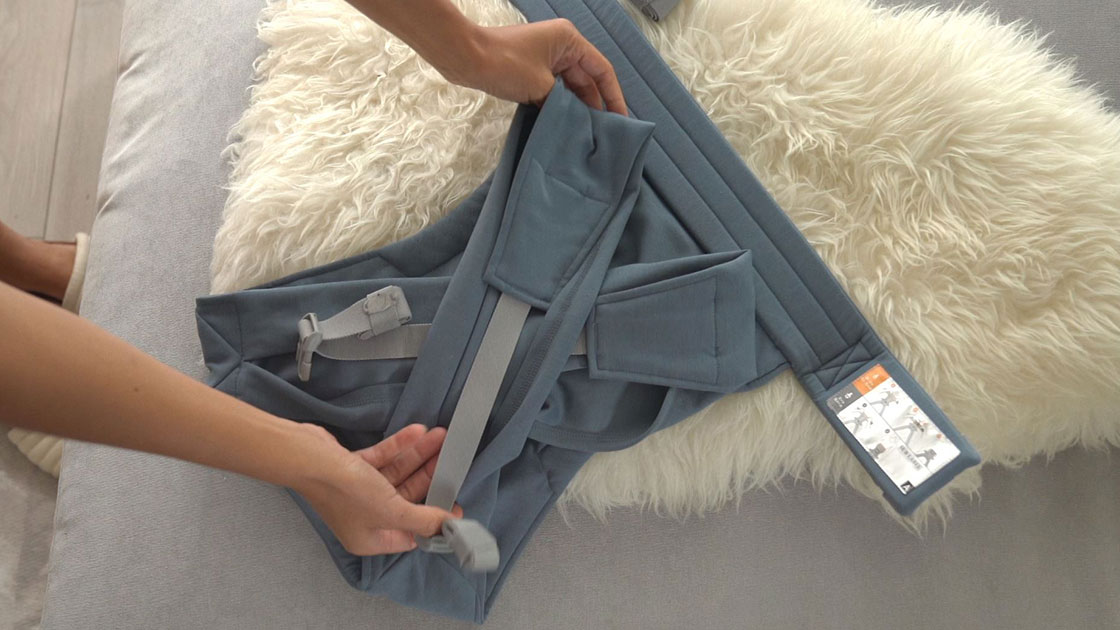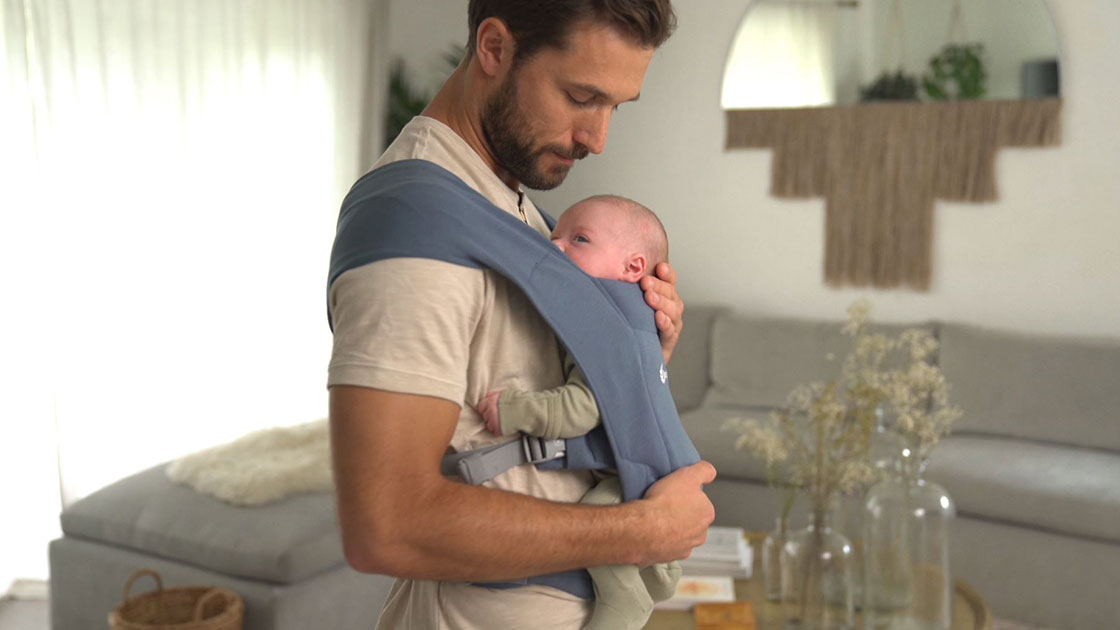Embrace Knit Newborn Carrier - Oxford Blue
Merges the coziness of a soft wrap with the simplicity of a carrier. No complicated wrapping or tying involved!
- Soft and cozy for newborns
- Simple and easy to use
- 7-25lbs, 0-12 months
- Facing In and Facing Out Carry Positions
- Ergopromise Lifetime Guarantee
At A Glance

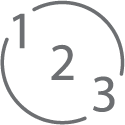
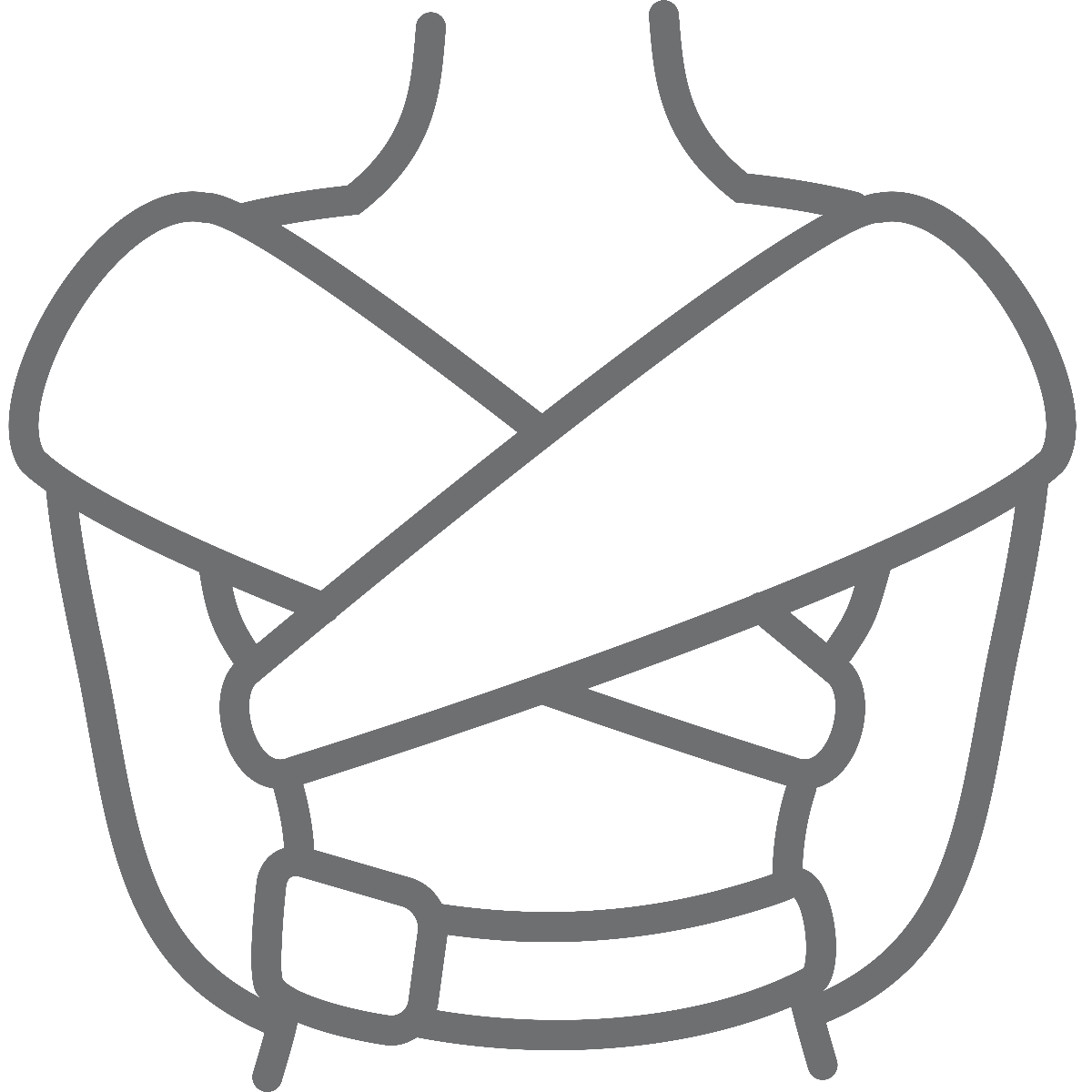
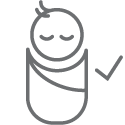
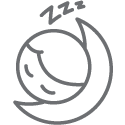
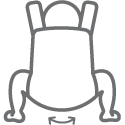

Soft & Snug Knit

Soft and Stretchy Fabric
Ponte knit offers firm and stable structure with a subtle sheen and maintains its shape without bagging. Resistant to pilling and fading, resilient, and ultra soft.

Hip Healthy
Adjustable flip waist belt creates the “M-shaped” positioning that supports babies hips comfortably as they grow.

Slim & Compact
Embrace goes with you wherever you go. Roll up in your diaper back or tucked in your stroller for easy transport.
Product Features
Product Details:
7 - 25 lbs
Machine Washable
Breastfeed In Carrier
Waistbelt range: 22 in - 54 in
MATERIALS:
79% Polyester
17% Rayon
4% Elastane/Spandex
Awards / Certifications

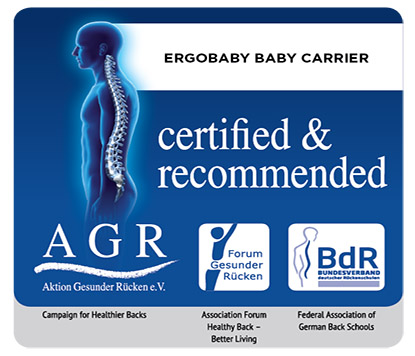

Carry Modes for Newborn and Beyond
Carry Modes for Newborn and Beyond
Fits All Sizes
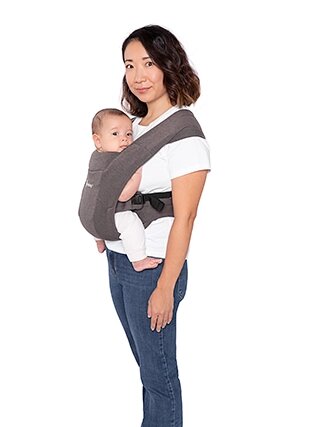
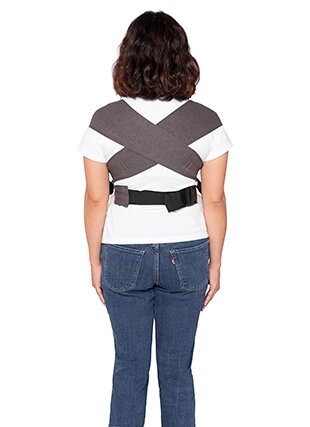
Height: 5'2''Pant Size: 4S
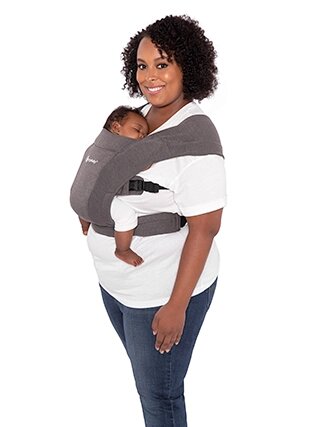
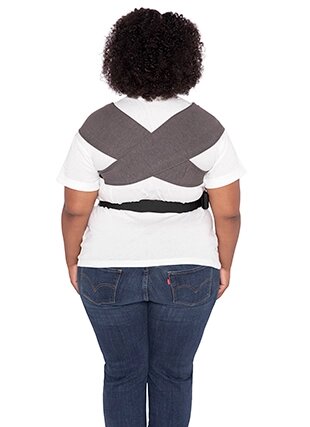
Height: 5'2''Pant Size: 16XL
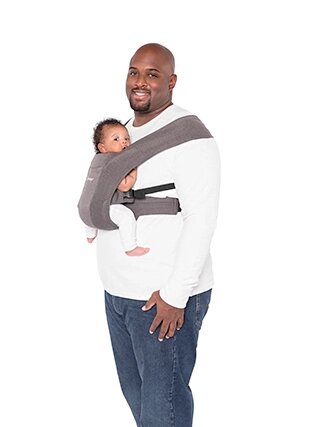
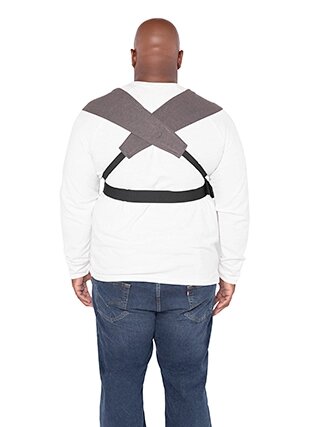
Height: 6'1''Pant Size: 42XXL
Instructions
FAQS
-
What is the age / weight / height range for the Embrace carrier?
The Embrace baby carrier is suitable from birth (minimum weight 7 lbs./3.2 kg and minimum height 20 in/50.8 cm) to 25 lbs./11.3 kg, typically around 12-18 months.
-
Can I use the Embrace baby carrier with my newborn baby?
Yes, the Embrace baby carrier was designed for the newborn phase. Babies must meet the minimum 20 inches/50.8 cm height and 7 lbs./3.2 kg weight.
The Embrace baby carrier adjusts to your newborn baby when the waistbelt is folded in twice in the Newborn Mode – Facing In position by shortening the back panel and narrowing the seat width.
-
What is the maximum weight for baby to be carried in the Embrace baby carrier?
The Embrace baby carrier can be used until your baby weighs 25 lbs./11.3 kg; typically around 12-18 months old. For you and your baby’s comfort, we recommend carrying baby weighing more than 25 lbs./11.3 kg in one of our other carriers that carries up to 45 lbs./20.4 kg like the Original or 360 baby carrier or strolling in the Metro Compact City Stroller.
-
Can I breastfeed with the Embrace baby carrier? How does that work?
Yes, as with all Ergobaby Carriers you can breastfeed while on the go. This can be done in the facing in carry positions. Just loosen the shoulder straps a bit and slightly lower baby to position on your breast. For safety, always stay seated when nursing in a carrier. Always stay vigilant while baby is nursing, and reposition after feeding, so baby’s face is not pressed against your body. Baby should be moved to recommended carrying position immediately after breastfeeding, remove slack from straps, and adjust.
-
How many ways can I carry my baby?
The Embrace baby carrier has three modes you can use to carry baby:
- Newborn Mode - Facing In
- Baby Mode - Facing In
- Baby Mode - Facing Out
Your baby's height and developmental milestones will determine the best mode to use.
- Newborn Mode - Facing In: From birth (at least 7 lbs./3.2 kg and 20 in/50.8 cm) to 23 in/58.4 cm (around 2 months). The Embrace baby carrier adjusts to your newborn baby when the waistbelt is folded in twice in the Newborn Mode – Facing In position by shortening the back panel and narrowing the seat width.
- Baby Mode - Facing In: From 23 in/58.4 cm (around 2 months) and up to 25 lbs./11.3 kg
- Baby Mode - Facing Out: An additional option for babies with strong head and neck control and taller than 26 in/66 cm (around 5-6 months). Baby’s face and chin must always clear the top of the panel.
Please refer to the instruction manual and instruction videos for each carry mode before using your Embrace carrier and before attempting new modes or positions.
-
Do I need to use the Ergobaby Infant Insert with the Embrace?
No, the Embrace baby carrier has been specifically designed so you can carry your newborn baby (minimum 7 lbs./3.2 kg and 20 in/50.8 cm) without the need of an infant insert. The Embrace baby carrier adjusts to your newborn baby when the waistbelt is folded in twice in the Newborn Mode – Facing In position by shortening the back panel and narrowing the seat width.
-
When is baby ready to be carried in Baby Mode - Facing In carry position?
Baby is ready to be carried in the Baby Mode (facing in) when they are taller than 23 in/58.4 cm - typically around 2 months. Because the waistbelt is secured with the panel hanging down like an apron, the Baby Mode - Facing In position allows for a longer back panel and wider supported seat for baby.
Babies shorter than 23 in/58.4 cm should be carried in the Newborn Mode – Facing In position, where the waistbelt is flipped inward twice to make the back panel shorter and seat width narrower.
-
When is baby ready to be worn in the Baby Mode - Facing Out carry position?
Every baby develops differently. You can start wearing your baby facing out once your baby demonstrates all the following: strong head and neck control, starts showing interest in the world around them, chin above the carrier panel, and taller than 26 in/66 cm. This is usually around 5-6 months. If baby gets sleepy or shows signs of overstimulation, turn baby around to face you. Therefore, we recommend the Facing Out position to be used for shorter durations of carrying only, so around 20 minutes. Baby should be removed completely from the carrier for repositioning.
-
As a parent, how do I decide which mode is better for my child: newborn mode, baby facing in mode, or baby facing out mode? And how can I know?
Knowing which mode to carry baby in will depend on baby’s height and the developmental milestones they’ve hit. Newborns under 23 in./58.4 cm should be carried in the Newborn Mode – Facing In with the waistbelt flipped inwards twice.
However, once they reach 23 in/58.4 cm, you can begin carrying in the ‘Baby Mode - Facing In’ and you no longer need to flip the waistbelt.
As your baby grows older and can see above the front panel of the carrier, has strong head & neck control, and has a natural curiosity to see and interact with the world, they are ready for front-outward carry. We recommend starting with short durations (5-10 minutes) to prevent over-stimulation.
Here are some signs that baby is becoming over-stimulated and ready to switch back to baby facing in mode:
- Baby seems tired, cranky, or fussy
- Baby is rubbing its eyes
- Baby is spreading fingers and toes, making fists
- Baby is laying hands in front of face
- Baby is ‘spacing out,’ sometimes baby will turn away and simply space out
- Baby is turning away again and again, trying to ‘switch off’
- If this all becomes too much for baby, baby may become drowsy
- Baby becomes hyper-vigilant (overly attentive). Instead of relaxed, baby’s body may stiffen
If you notice these cues, we recommend switching baby to inward facing carry position and/or create a quiet, calm environment to help baby relax and recharge.
-
Can I carry my newborn baby in the facing out position?
No. You should never carry your baby facing out until the following developmental milestones are met:
- Once they are over 26 in/66 cm
- Display good head and neck control
- Chin clears the back panel when in good positioning
-
How do I know if my baby is ready for baby facing out mode?
Babies are born with an immature nervous system and are easily overstimulated by too much noise, activity, and sensation in the world around them. Baby simply can't process it all and needs some quiet time, a moment to relax, and a chance to calm down.
Once your baby can see above the front panel of the carrier, has strong head & neck control, and has a natural curiosity to see and interact with the world, they are ready for front-outward carry. We recommend starting with short durations (5-10 minutes) to prevent over-stimulation.
Here are some signs that baby is becoming over-stimulated and ready to switch back to baby facing in mode:
- Baby seems tired, cranky, or fussy
- Baby is rubbing its eyes
- Baby is spreading fingers and toes, making fists
- Baby is laying hands in front of face
- Baby is ‘spacing out,’ sometimes baby will turn away and simply space out
- Baby is turning away again and again, trying to ‘switch off’
- If this all becomes too much for baby, baby may become drowsy
- Baby becomes hyper-vigilant (overly attentive). Instead of relaxed, baby’s body may stiffen
If you notice these cues, we recommend switching baby to inward facing carry position and/or create a quiet, calm environment to help baby relax and recharge.
-
Is forward facing comfortable for parents?
The Embrace baby carrier allows parents to carry baby facing out with less strain on back and shoulders. However, parents will find that the baby facing in mode will be most comfortable for longer durations of carrying. For more comfortable facing out carry, we recommend a more supportive and structured carrier like the 360.
-
How do I wear the Embrace carrier waistbelt?
The waistbelt should be secured high and tight on the wearer's body. In the Newborn mode - Facing In, the waistbelt should be folded inwards twice. In the other modes, the waistbelt will be secured without any folding high along your torso and hang down like an apron. As reference, the product labels along the waistbelt should always be on the inside and the waistbelt buckle should always be facing out. We recommend browsing and watching the instruction videos for step by step instructions.
-
How should the shoulder straps be worn? How do I wear the shoulder straps?
Always cross the shoulder straps with the Embrace baby carrier. In the Newborn mode - Facing In, spread the straps at the shoulders for additional head and neck support. In the Baby Mode (Facing In), spreading the straps at the shoulder is optional. When wearing baby in the Baby Mode - Facing Out position, do not spread the straps across your shoulder.
-
How do I make sure my baby’s head is supported with the Embrace baby carrier?
The baby carrier includes a padded head and neck support at the carrier’s neckline which should cover and support the head at mid-ear level. When securing baby into the carrier, pull the neck support up to mid-ear level before securing straps. This will ensure proper neck panel height. Next, rotate baby’s hips so baby's bum sinks deep into the carrier. To make sure the fabric around baby’s head and neck is taut and supported, spread the shoulder straps around your shoulders. Ensure the padded head and neck support remains in place around baby's mid-ear level. We recommend browsing and watching the instruction videos for step by step instructions.
-
How do I make sure my baby’s hips are in an ergonomic spread-squat position (M-position) with thighs well supported and baby's back supported in a natural position in the Embrace carrier?
After securing shoulder straps, always make sure baby's bum is evenly centered in the carrier. Reach inside the carrier and rotate baby's hips, sinking baby's bum deep into the carrier to encourage a comfortable C-shaped spine position. Make sure baby's knees are positioned higher than baby's bum for a proper spread-squat position (M-position). Finally, ensure the fabric under baby's thighs reach from knee to knee. We recommend browsing and watching the instruction videos for step by step instructions.
-
How does the Embrace differ from a wrap like the Aura wrap?
Both the Aura stretchy wrap and the Embrace baby carrier are made of a lightweight and soft knit material and are great newborn/small infant carry options. Whereas the Aura wrap is one long piece of breathable, ultra-soft fabric designed to wrap and tie around the body to secure baby, the Embrace baby carrier is as cozy and soft as a wrap in a simple, easy to use structure of a carrier, and secured with three buckles. We recommend you browse our videos to see which product might be best for you.
-
How does the Embrace differ from the other Ergobaby soft structured carriers like the Adapt and Omni 360?
The Embrace baby carrier is a more lightweight, slimmer, cozy option for carrying babies from birth up to 25 lbs./11.3 kg. Many of our other carrier models are more structured, with increased padding in the shoulder straps, a wider waistbelt with lumbar support, and can carry baby up to a higher weight limit (up to 45 lbs./20.4 kg). These design features make them more suitable for comfortable babywearing as baby grows or for increased activity. Additionally, our other structured carriers also allow for more versatility in carry positions (hip, back) and features (hood, pockets).
-
Are there any certifications acknowledging the Ergobaby Embrace carrier is ergonomic?
Yes, all Ergobaby carriers have been acknowledged by the International Hip Dysplasia Institute as "Hip Healthy" products and awarded a Seal of Approval by the AGR of Germany as back healthy for babies and parents. The AGR Seal of Approval is awarded to products whose back-friendly design has been verified by an independent testing committee made up of experts from various medical disciplines. For more information go to https://www.agr-ev.de/en/
-
Does the Embrace Knit carrier have any harmful materials?
No, the Embrace baby carrier is thoroughly tested to meet or exceed global and internal chemical requirements.
-
What kind of fabric is the Embrace baby carrier made of and how does it differ from the other Ergobaby soft structured carriers?
The Embrace baby carriers are made of a slightly stretchy, yet supportive, lightweight knit fabrics. Other Ergobaby carriers (e.g. 360, Adapt, and Omni 360) are made from a woven cotton fabric.
-
Is the Embrace baby carrier machine washable?
Yes, the Embrace baby carrier is machine washable as are all our carriers. Make sure to fasten all buckles before washing. We recommend putting the carrier in a pillowcase. Use mild detergent free of bleach, perfumes, dyes, chlorine, or optical brighteners. Machine wash cold (30°C) and air dry.
-
What is the weight of the Embrace carrier?
The Embrace is a super lightweight carrier.
Embrace Knit weighs in at 17 ounces/480 grams.
Embrace Soft Air Mesh weighs in at 15 ounces / 420 grams. -
What sizes does the Embrace baby carrier fit?
The Embrace baby carrier fits a wide range of bodies and most sizes XS-XXL.
-
How much smaller is the Embrace carrier panel when folded twice in the Newborn Mode - Facing In vs. the Baby Modes?
With the waistbelt flipped inwards twice (Newborn Mode - Facing In), the length of the back panel (from base of waistbelt to the top of the panel) shortens by 3.5 in/9 cm. The width of the back panel at the base of the carrier narrows from 11.8 in/30 cm to 10 in/25.5 cm.
-
What are the measurements of the shoulder straps and waistbelt?
The padded part of the waistbelt is 2.8 in/7 cm wide and 22.4 in/57 cm long. The waistbelt webbing is 32.3 in/82 cm long.
The spreadable shoulder straps are 3.9 in/10 cm wide. When spread out, the shoulder straps measure 9.2 in/23.5 cm. The shoulder strap webbing is 21.2 in/54 cm long.
-
Does the Ergobaby Embrace baby carrier come with the ErgoPromise Guarantee?
Yes, as with all our baby carriers and wraps, the Embrace comes with the ErgoPromise Lifetime Guarantee. If you find a manufacturing or material defect, we’ll replace your carrier or part at no charge.
We stand by our products so you can carry your precious cargo with confidence.
-
How does the Embrace Soft Air Mesh differ from the Embrace Knit?
Embrace Cozy Newborn carrier is the soft and simple way to wear your newborn, and is now available in two great fabrics. Embrace Soft Air Mesh is made from Aerated Pin Dot Knit (100% polyester) and Soft Air Mesh (a polyester and spandex blend), and features a vented back panel for targeted breathability creating a design that’s soft, cool, and breathable. Embrace Knit made from a ponte knit (a thick, double-knit, jersey-like fabric) is soft, comfortable and nestles baby in close for a supportive and snug fit.








